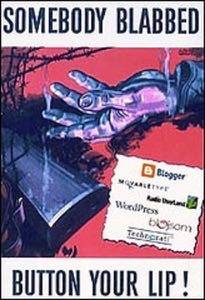Earlier this week Alex Iskold wrote that there is no money for bloggers in the long tail, even if there is money from aggregating the long tail.

There are many different motivations for blogging and some do not involve money. Some people have a cause they are passionate about – they want to help change the world and a blog is a marvellous way to get attention for that cause. Others don’t even want to change the world or get noticed, they are just passionate about something and enjoy writing about it – attention is a by-product.
These bloggers may have Adsense ads and Amazon affiliate links. Who wants to turn away “no effort” money, however small? Just don’t judge them by their revenue, it is a by-product.
The bloggers who don’t have either a financial motivation or a passion, tend to move to social networks and Twitter-type microblogging models.
The bloggers who are financially motivated break down into two broad types:
1. Unchained journalists and early bloggers turned aspiring media mogul – think Mike Arrington, Om Malik, Arriana Huffington, Henry Blodget, Jason Calacanis and of course our own Richard MacManus. It is such a great business for those that make it; so many more will be tempted to try. The barriers to entry are much more than they were for the innovators in the early days, but they are still lower than most businesses and new spaces are constantly emerging. So the blogosphere will always be full of blogs with minimal revenues and big ambitions, just like we have lots of start-up technology companies with minimal revenues and big ambitions.
2. Blogging for Attention that translates into other revenue. This is simply the open source model applied to writing. Why does a software engineer spend a lot of time writing code that they give away as open source? There are certainly some who do it for non-financial reasons; they just love writing code or they want to kick an evil empire in the shins. However this assumes a day job or a rich uncle- because the huge open source industry would not sustain on this basis otherwise.
The simple economic rationale is increasing billing rates. Let’s say I am a free agent developer charging $50 per hour. If I work 8 hours and have 100% utilization, I make $8,000 per month. Now let’s assume that I spend 6 months investing my time writing some code to donate to open source. I have invested $48,000 (6 months at $8,000). In reality developers will tend to “invest” their moonlight hours at evenings and weekends; and other non-billable time. So this example is just to make the calculations simple.
Now imagine that the code gets traction in the open source community (that is a big if, this only works for talented developers who choose a real problem to solve). Can this developer increase their billing rate? Can they charge say $75 per hour? If so, the developer has a Return On Investment within 12 months.
In practice, the odds of success are not good, but the upside return is much higher. The odds of success are low because so much good code is given away free that you have to a) build great code not just good code and b) be savvy about getting adoption. Free is no longer a selling feature for software.
However the return potential is also much higher. This is particularly true for developers in developing countries. Let’s say I am a really smart 20 year old developer in Siberia working for a big outsourcing firm by day and hacking away my masterpiece at night. There is a big opportunity to transform my career; the per hour increase maybe 10x from $5 to $50. If I can also create an “enterprise version” that I can charge for, the upside is huge.
The economics are similar for writers who blog to get attention, in the hope that the attention can be leveraged into other revenue. There are 3 different models:
1. Corporate blogger. This is now so common in the technology and new media worlds that it is just another part of About Us. Start-ups tend to do this well, established enterprises are mostly still struggling for a formula that works in the community while meeting old management desires for control. Corporate blogging serves a useful purpose that falls between the cracks of Press Releases and White Papers (i.e. we have something interesting to a small part of our market, but not important enough to get picked up by traditional media). This is PR 2.0. The content has to be good; boring old press releases and white papers with jargon-laden corporate-speak won’t work any more. The Corporate blogger is like the Linux coder at IBM; they get a salary and blogging is just part of the job description.

2. Deal Flow Filters.Fred Wilson is a leader at this and now most VCs feel the need to blog. This serves two purposes. First it helps filter their deal flow; entrepreneurs know what will interest them and they can start an informal dialogue via comments. Second it makes the VC look like a reasonable human being that an entrepreneur will want to meet. This same model can work for others in the deal business. I can imagine an M&A banker blogging about deals they are interesting in sourcing.
3. Consultants in a Knowledge intensive space. This is directly analogous to the developer using open source to increase their lead flow and billing rate. The idea is simply to create some useful analysis/insight so that your market sees you are useful. This brings deal flow and enhances credibility (i.e. improves closure and bill rates). As with software, the nominal barriers are zero, but in practice a) your analysis/insight has to be valuable and b) you have to be savvy about building an audience. Blogging also works as a deal flow filter; experts have only so many hours to sell, so they need highly qualified leads who already know what they do well (and, critically, what they don’t do).
This last category is interesting because it has long tail characteristics. There is an almost inexhaustible supply of experts in all kinds of niches working as free agents or in small companies. I call these the Attention $ bloggers (as opposed to the Ad $ blogger).
This category also obeys its own power law – these are people who have long understood the economics of giving away content to leverage consulting fees. Nicholas Carr is a good example. His excellent Rough Type blog offers insights in a readable style with humor. The only advertising is for his own books and notice his blogging frequency is timed for a new publication. This is easier than the traditional book signing tour. The book in turn feeds the consulting practice. The Internet did not create the economics of writing for attention, but it did open it up to many more people.
Conclusion
Blogger Networks (a.k.a media firms) make money initially by attracting the Ad $ blogger. Some smarter media firms are now getting better at figuring out how to motivate and manage the Attention $ blogger. Huffington Post is one example. The management issues are complex though – the Attention $ blogger who pushes too hard to sell a service or a point of view will lose their audience and harm the reputation of the media firm/network.
What do you think? Why do you blog? What value do you get from blogging?









